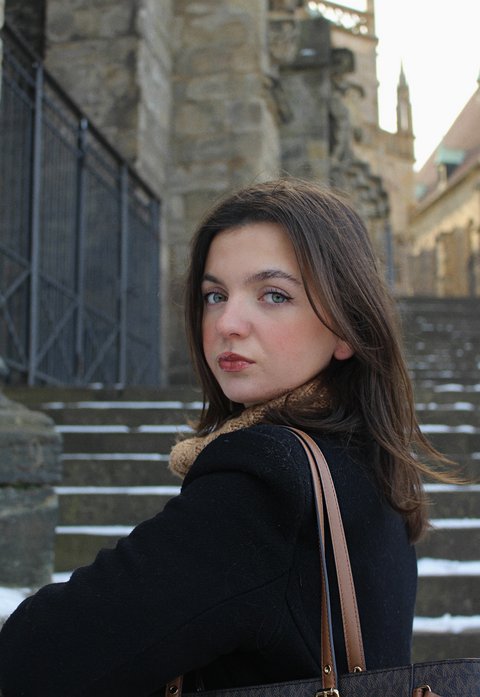
Selena Buzhala
Albert-Einstein-Straße 9 | Room: S41
07745 Jena
tel.: 03641 206 166
Curriculum Vitae
Education
- since 18.02.2025
Doctoral Researcher at Leibniz Institute of Photonic Technology (IPHT), Jena | Topic: Functional Interfaces - 10/22 - 01/25
Master of Science (Photonics) at Friedrich Schiller University Jena, Jena (Abbe School of Photonics) - 10/17 - 07/21
Bachelor of Natural Sciences (Physics) at University of Prishtina, Prishtina (Kosovo)
Experience
- Master’s Thesis – Leibniz Institute of Photonic Technology (IPHT), Jena, Germany
Prof. Dr. Benjamin Dietzek-Ivanšić
(10.10.2024-29.01.2025)
Topic: An investigation of transient absorption spectroscopy signals from ruthenium-based photosensitizers in cellulo. - Internship – Leibniz Institute of Photonic Technology (IPHT), Jena, Germany
Prof. Dr. Ute Neugebauer
(16.10.2023 – 18.09.2024)
Topic: Hyperspectral mid-IR photo-induced force microscopy applied to the model system Bacillius subtilis – Vancomycin. - Internship – Leibniz Institute of Photonic Technology (IPHT), Jena, Germany
Prof. Dr. Benjamin Dietzek – Ivanšić
(01.08.2023 – 30.09.2023)
Topic: Calibration of a bright-field and a fluorescence microscope. - Physics teacher – Elementary school “Dituria”, Ferizaj, Kosovo
(23.11.2021 – 23.06.2022)
Language skills
- Albanian (native)
- English (C1 level)
- German (B1+ level)
Digital skills
- C++ programming
- Matlab
- Python
PhD Project
Understanding the molecular mechanisms behind light-driven membrane and surface switching requires insights into excitonic properties and excited-state deactivation pathways. This includes studying photochemical events like photo-switching in complex environments. To achieve this, we will combine ultrafast time-resolved absorption, emission, and emission-anisotropy experiments to analyze photoinduced dynamics. Additionally, in situ and time-resolved vibrational sum-frequency generation (VSFG) will reveal the effects of transient charge distributions on interfacial membrane structures. This approach provides a comprehensive view of local light-induced switching events over timescales from sub-100 fs to several nanoseconds.
We employ UV/Vis and mid-IR femtosecond transient absorption spectroscopy to track excited-state reactivity in molecular components within Langmuir layers and biomimetic membranes. Environmental factors, such as pressure variations during Langmuir layer formation, influence isomerization and charge-transfer kinetics. Changes in polarizability and restricted conformational flexibility of donor-acceptor dyes impact charge transfer rates, responsivity, and the longevity of the charge-separated state, which can be examined via ns-transient absorption spectroscopy.
To explore cooperativity in photoswitching and intermolecular dye interactions, we will conduct pump-intensity-dependent transient absorption spectroscopy. At low intensities, signals arise from individual excited dyes, whereas higher intensities increase the likelihood of adjacent chromophores being excited simultaneously, revealing cooperative effects in light-induced processes.
UV/Vis pump-pump-probe spectroscopy enables tracking multiple switching events, such as consecutive cis-trans and trans-cis isomerizations. In model membranes, we will test whether second-pulse dynamics depend on prior membrane fluidity changes.
VSFG will be used to monitor photo-induced processes in organic membranes, focusing on isomerization dynamics in light-responsive carbon nanomembranes. In situ time-lapse VSFG spectroscopy will study structural changes at glass surfaces and biomimetic membranes, revealing how light-driven reactivity alters membrane fluidity and phospholipid packing.
Hands-on training in time-resolved ultrafast spectroscopy will be complemented by theoretical insights to help interpret experimental observations. Collaborations with teams focused on material synthesis and functional characterization will provide a deeper understanding of light-driven switching events while also fostering interdisciplinary research.
Conference talks and poster presentations
Conference talk
- High-resolution chemical imaging of model system Bacillus subtilis using mid-IR photo-induced force microscopy (PiF-IR) (DPG-Physik, Berlin, Spring 2024)